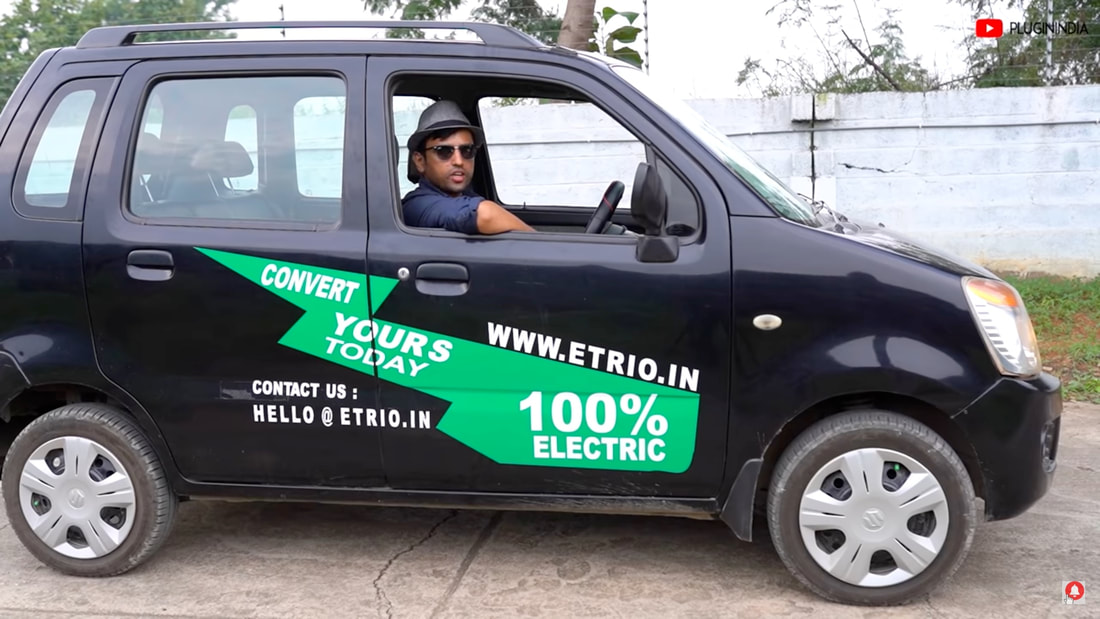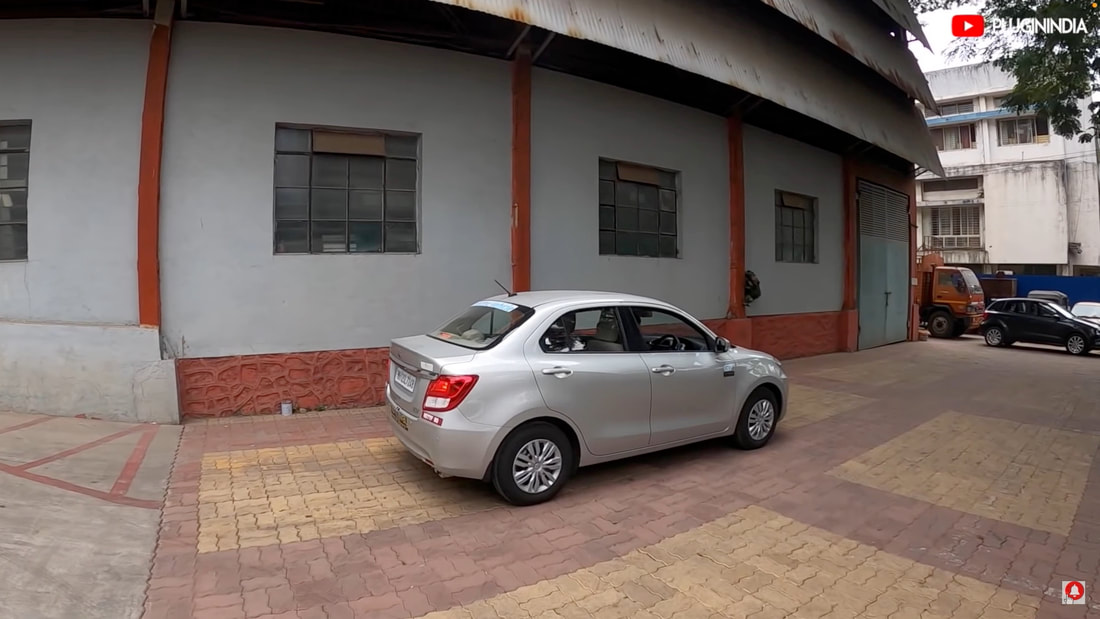By Abhishek & Kamlesh
In this episode of Electric Car Watch, we will talk about the challenges facing electric car conversions and what the industry and agencies can do better to make it easier.
In this episode of Electric Car Watch, we will talk about the challenges facing electric car conversions and what the industry and agencies can do better to make it easier.
Video: The sad state of Electric Car conversions in India
We released two videos on Electric car conversions over the last few years. One was the conversion kit by Hyderabad based e-Trio, and the other was Pune based Northway Motorsports. And the interest in electric car conversions was immense. Many of you want to convert your existing petrol/diesel cars into electric cars. Some wanted to convert a Maruti Dzire, some an Audi A4, some an Hyundai i20, and some a Tata Nano. All of you are comfortable using your cars and want to switch to electric without sacrificing that comfort. But the reality is, for now at least, most electric car conversions are destined to remain a pipe dream. Basically, electric conversions involve removing the entire internal combustion paraphernalia rom an ICE car, installing an electric motor in its place, and adding a large battery bank. The costs of such a conversion will usually be based on your range requirements. Usually, for a 150+ km range car, the cost is around 5-6 lakhs. But, for this expense, you'll get a zero-emission vehicle that costs only a few rupees per km to run. Your electric car will also be more reliable and require much less maintenance than a pollution car.
Sounds utopian, right? But let’s talk about why most of you can’t convert your car. In India, ICE to electric car conversions are highly regulated. These rules are specified in the AIS 123, which mentions all the tests performed on the converted car: energy consumption tests, gradeability tests, range tests, motor tests, braking tests, and so on. Only when a kit provider has successfully got certified can they start selling the kit in the market.
Challenges for Kit Makers
Now here is the big limitation kit providers face. Every car model out there needs to go through a separate certification process. For example, a kit provider will convert a Maruti Swift Dzire car and get it certified. This does not mean that they can fit the kit in a Maruti Swift or Alto. The kit provider will have to get their kit separately certified for the Swift or the Alto. This drives up the cost for the kit provider. For every conversion, they have to pay 35-40 Lakh to ARAI. And then they have to spend another 30-40 lakh on RnD and testing, which is essentially a 1 CR investment per kit per car.
That is why we have very few service providers for certified kits. We have Northway Motorsports, who will start selling their kits for the Maruti Swift Dzire, Maruti Ignis, and Tata Ace Gold commercial loader. Then, we have eTrio, who have kits for the Swift Dzire, Alto, and a few other vehicles.
So if you have an Audi A4 or Hyundai i20 or a Tata Nano, you are out of luck. Unless you happen to have a few crores lying around that you don't mind spending, you will have to wait for kit providers who are willing and can afford to spend big bucks on certification.
Challenge for consumers
Another issue is cost. The conversion kit for each car with a decent range of 200 km will cost more than 7 lakhs. At these prices, many people would prefer to add a few more lakhs and get a new car. Also, the question of servicing these kits is still an open one. If something goes wrong, will the kit service provider offer service? What about the original OEM? Once a kit is fitted, you can never take your Swift dzire to a Maruti dealer. They will chase you away.
All of these factors create uncertainties for the consumer and kit service provider. We think kit service providers can target fleet companies and do bulk conversions. That is a large market. But at an individual level, there are many questions that need answering.
Sounds utopian, right? But let’s talk about why most of you can’t convert your car. In India, ICE to electric car conversions are highly regulated. These rules are specified in the AIS 123, which mentions all the tests performed on the converted car: energy consumption tests, gradeability tests, range tests, motor tests, braking tests, and so on. Only when a kit provider has successfully got certified can they start selling the kit in the market.
Challenges for Kit Makers
Now here is the big limitation kit providers face. Every car model out there needs to go through a separate certification process. For example, a kit provider will convert a Maruti Swift Dzire car and get it certified. This does not mean that they can fit the kit in a Maruti Swift or Alto. The kit provider will have to get their kit separately certified for the Swift or the Alto. This drives up the cost for the kit provider. For every conversion, they have to pay 35-40 Lakh to ARAI. And then they have to spend another 30-40 lakh on RnD and testing, which is essentially a 1 CR investment per kit per car.
That is why we have very few service providers for certified kits. We have Northway Motorsports, who will start selling their kits for the Maruti Swift Dzire, Maruti Ignis, and Tata Ace Gold commercial loader. Then, we have eTrio, who have kits for the Swift Dzire, Alto, and a few other vehicles.
So if you have an Audi A4 or Hyundai i20 or a Tata Nano, you are out of luck. Unless you happen to have a few crores lying around that you don't mind spending, you will have to wait for kit providers who are willing and can afford to spend big bucks on certification.
Challenge for consumers
Another issue is cost. The conversion kit for each car with a decent range of 200 km will cost more than 7 lakhs. At these prices, many people would prefer to add a few more lakhs and get a new car. Also, the question of servicing these kits is still an open one. If something goes wrong, will the kit service provider offer service? What about the original OEM? Once a kit is fitted, you can never take your Swift dzire to a Maruti dealer. They will chase you away.
All of these factors create uncertainties for the consumer and kit service provider. We think kit service providers can target fleet companies and do bulk conversions. That is a large market. But at an individual level, there are many questions that need answering.
What can be done better?
Converting a car is definitely a much more environmentally friendly process than manufacturing a new car, and car conversion processes can be made easier. The question is, can India offer certifications for a family of cars instead of individual models? Can we reduce certification costs?For now, government rules are stacked against kit providers and consumers. To be sure, India isn't the only country with so many bureaucratic hurdles when it comes to conversions. New Zealand, for example, requires converted cars to undergo regular checks, and even a minor issue like onset of rust can lead to a request for recertification being denied. In many countries in Europe, conversions are outright banned. Even in the US, that free market bastion, converted cars are not allowed to be recharged at public charging stations in some states, certification or no certification. Maybe the ICE car auto industry or BIG OIL is behind this, or maybe this is the typical disease that ails all bureaucracies: the fear of change. In India's case at least, I don't see the government forfeiting the lakhs it can make per conversion anytime soon. Maybe things will change in the future as demand for EV's rises and car companies fail to keep up. Conversion companies will then step in to fill the gap. And as we've seen time and again in this country, the government only loosens its chokehold over the public sector when it can no longer ignore market forces without dire consequences.
Recently the Delhi government recently released a statement to allow retrofitting of diesel vehicles in the city which will enable their use beyond the prescribed time span of 10 years, a first such move in the country. The Delhi transport department will soon empanel manufacturers of pure electric kits by approved testing agencies, so that diesel vehicles may continue plying here beyond 10 years. We still don’t know the process and costs involved in certification. But atleast one state government is making some moves to make EV conversions easier.
Thanks for reading. Do write in the comments below on your observations and research about conversion kits for electric cars. What can the industry do better? Do you plan to convert your car?
Our Video Shoot Gear
Converting a car is definitely a much more environmentally friendly process than manufacturing a new car, and car conversion processes can be made easier. The question is, can India offer certifications for a family of cars instead of individual models? Can we reduce certification costs?For now, government rules are stacked against kit providers and consumers. To be sure, India isn't the only country with so many bureaucratic hurdles when it comes to conversions. New Zealand, for example, requires converted cars to undergo regular checks, and even a minor issue like onset of rust can lead to a request for recertification being denied. In many countries in Europe, conversions are outright banned. Even in the US, that free market bastion, converted cars are not allowed to be recharged at public charging stations in some states, certification or no certification. Maybe the ICE car auto industry or BIG OIL is behind this, or maybe this is the typical disease that ails all bureaucracies: the fear of change. In India's case at least, I don't see the government forfeiting the lakhs it can make per conversion anytime soon. Maybe things will change in the future as demand for EV's rises and car companies fail to keep up. Conversion companies will then step in to fill the gap. And as we've seen time and again in this country, the government only loosens its chokehold over the public sector when it can no longer ignore market forces without dire consequences.
Recently the Delhi government recently released a statement to allow retrofitting of diesel vehicles in the city which will enable their use beyond the prescribed time span of 10 years, a first such move in the country. The Delhi transport department will soon empanel manufacturers of pure electric kits by approved testing agencies, so that diesel vehicles may continue plying here beyond 10 years. We still don’t know the process and costs involved in certification. But atleast one state government is making some moves to make EV conversions easier.
Thanks for reading. Do write in the comments below on your observations and research about conversion kits for electric cars. What can the industry do better? Do you plan to convert your car?
Our Video Shoot Gear
- GoPro HERO9 Black Camera - https://amzn.to/3gtsLCW
- RODE Wireless Go II Audio Recorder - https://amzn.to/3HwF512
- Zoom H1n Handy Wired Audio Recorder - https://amzn.to/3JbWeNR
- Zhiyum 3-Axis Smartphone Gimbal - https://amzn.to/3GwXae0
- DISCLAIMER: These are affiliate links, which means that if you click on one of the product links, we will receive a small commission. This helps support the platform and allows us to continue to make content like this.
Thank you for the support!


